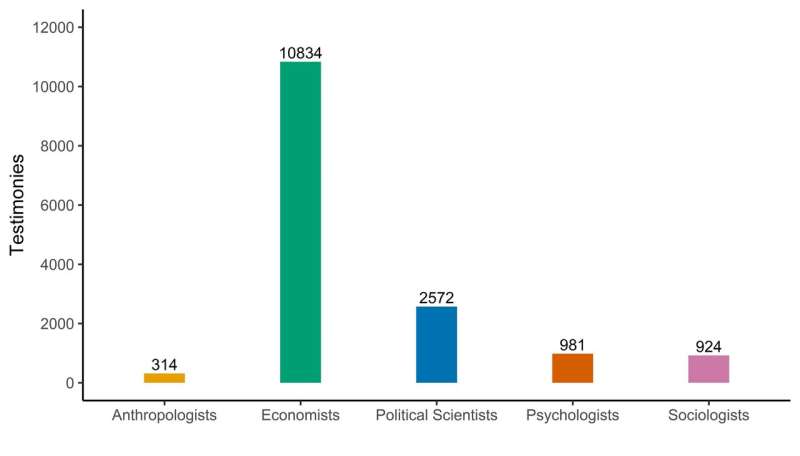New dataset reveals trends in social scientists' congressional testimony

From 1946 to 2016, testimony from economists accounted for more than two thirds of all instances of U.S. congressional testimony delivered by social scientists. Thomas Maher of Purdue University, Indiana, and colleagues present these findings in the open-access journal PLOS ONE on March 25, 2020.
The U.S. Congress regularly invites stakeholders and experts to speak before lawmakers at congressional hearings as a central component of the legislation process. Social scientists are among those who may be invited to testify (testimonies by social scientists represent about 2% of all congressional testimonies from 1946-2016). However, the impact of their testimony is difficult to ascertain, in large part due to a lack of quantitative data on their appearances before Congress.
To address this data gap, Maher and colleagues analyzed the congressional record and compiled a new, publicly available dataset on testimony from social scientists between 1946 and 2016. They categorized social scientists into five major disciplines: economists, political scientists, sociologists, psychologists, and anthropologists.
The new dataset revealed 15,506 instances of testimony from social scientists, 10,834 of which were from economists. Testimony from economists occurred more than four times as often as testimony from political scientists, and more than 10 times as often as testimony from sociologists. Anthropologists had the lowest rate of testimony.
The researchers also examined the organizations represented by social scientists who delivered congressional testimony. Over the study period, they found an increase in the proportion of testimony from social scientists—especially political scientists—who represent think tanks, as opposed to academic institutions or other governmental or non-governmental organizations. Additionally, economists are most present at congressional hearings, while anthropologists and sociologists have a declining presence.
The new dataset could help inform research into the impact of social scientists' testimony on legislation, and why their testimony is increasingly associated with think tanks.
The authors add: Economists are invited to testify before Congress significantly more often than any other social scientist, and their dominance has held even as the sources of expertise have diversified with the growth of think tanks and industry positions.
More information: Maher TV, Seguin C, Zhang Y, Davis AP (2020) Social scientists' testimony before Congress in the United States between 1946-2016, trends from a new dataset. PLoS ONE 15(3): e0230104. doi.org/10.1371/journal.pone.0230104
Journal information: PLoS ONE
Provided by Public Library of Science




















